The final version of the Program of 8OSME is now released, please find the attached program for the 3 days via the link below:
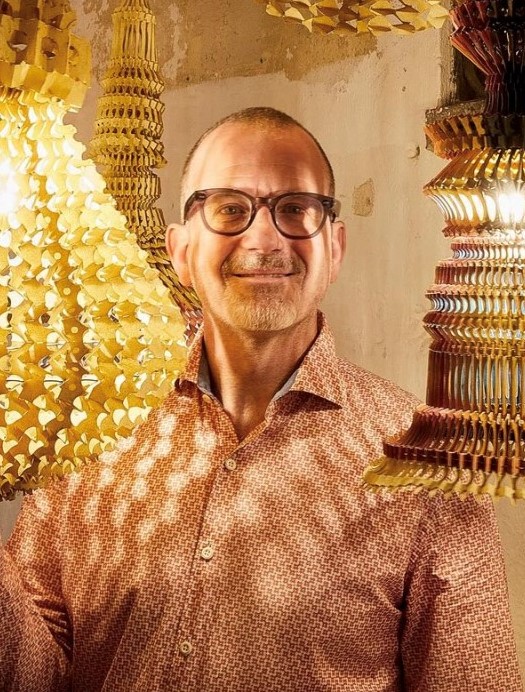 A Paper Engineer. Creator of Drawstring Origami.
A Paper Engineer. Creator of Drawstring Origami.
Darryl Bedford
Title: Beyond Origami: Structure, Kinetics, Aesthetics and Biomimicry
As a paper engineer and artist, Darryl Bedford is captivated by the space where traditional origami techniques merge with the power of digital design and how the incorporation of strategically placed cuts, impact on structure. This unique blend allows him to craft kinetic sculptures that celebrate both the intricate beauty of the natural world and the wonders of modern technology.
Darryl Bedford’s inspiration comes from the mesmerizing realm of radiolarians, microscopic ocean beings with stunning complexity and movement. Through his work, Darryl Bedford translate their ethereal essence into captivating structures, often incorporating elements of performance and videography to further enhance their otherworldly feel. However, Darryl Bedford’s passion extends beyond mere aesthetics. He is drawn to the meditative and therapeutic nature of paper folding, believing it has the power to reconnect us with the natural world.
Darryl Bedford has had the privilege of exhibiting his work internationally, showcasing it in Australia, the UK, and the US. His artistic exploration has even landed him a spot on BBC TV's "Kirstie's Handmade Christmas". Recent projects have involved a successful fashion runway and an exhibit at Milan's prestigious Salone del Mobile.
He is also committed to pushing the boundaries of this art form, continuously seeking new and innovative ways to extend and apply origami with particular emphasis on structure, kinetics and aesthetics.
Presentation Description:
Darryl's presentation will explore the intersection of artistry, innovation, and therapeutic application in paper engineering. The artist, a multidisciplinary educator, and paper engineer, draws inspiration from microscopic organisms and Ernst Haeckel, pushing the boundaries of paper art by blending origami and kirigami techniques. Techniques such as pleated origami and surface decoration are combined with functionality, creating structures with both form and movement. Practical applications range from objects to sculptures, with a focus on visual spatial processing and exploration in the design process. Showcase projects include fashion, performance art, soft robotics, and practical decor. Additionally, the presentation will delve into the healing power of paper, exploring its benefits in therapy through the development of therapy toys using Drawstring Origami. Finally, Darryl will discusse his recognition and impact, including his social media reach and audience engagement.
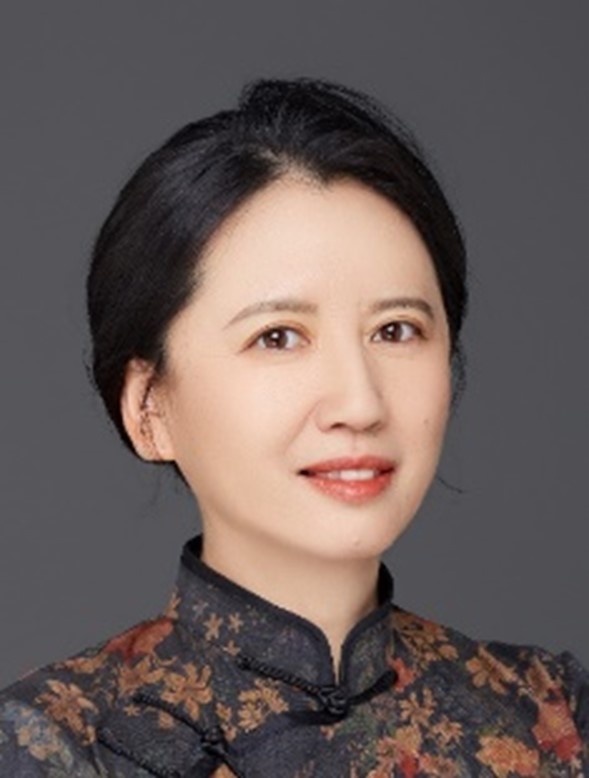 Professor of Tianjin University
Professor of Tianjin University
Yan Chen
Title: Modular Origami: Kinematics and Metamaterials
Professor Yan Chen received her D. Phil. from University of Oxford in 2004. She is currently a Chair Professor in Tianjin University. Her research focuses on the kinematics of spatial mechanism, design of deployable structures, origami metamaterials, and mechanical intelligent robots. She has published more than 90 journal papers in Science, NC, PNAS, AFM, Research, Engineering, MMT, etc.. Her research details can be found in http://motionstructures.tju.edu.cn/.
Presentation Description:
Modular origami structures with internal degrees of freedom show great potentials and advantages in the design of metamaterials. This talk will focus on metamaterials based on modular origami structures from the perspective of the interdisciplinary study of mechanism and mechanics, including the kinematic modeling of the mechanism of modular origami, the kinematic compatibility conditions for the assemblies of multiple origami structures, and the analytical relationship between the metamaterial properties and unit cell geometries. Such fundamental study leads to the programmability and tuneability of properties in constant or negative Poisson’s ratio metamaterial, transformable extremal metamaterial, multistable frequency-reconfigurable metamaterial and so on.
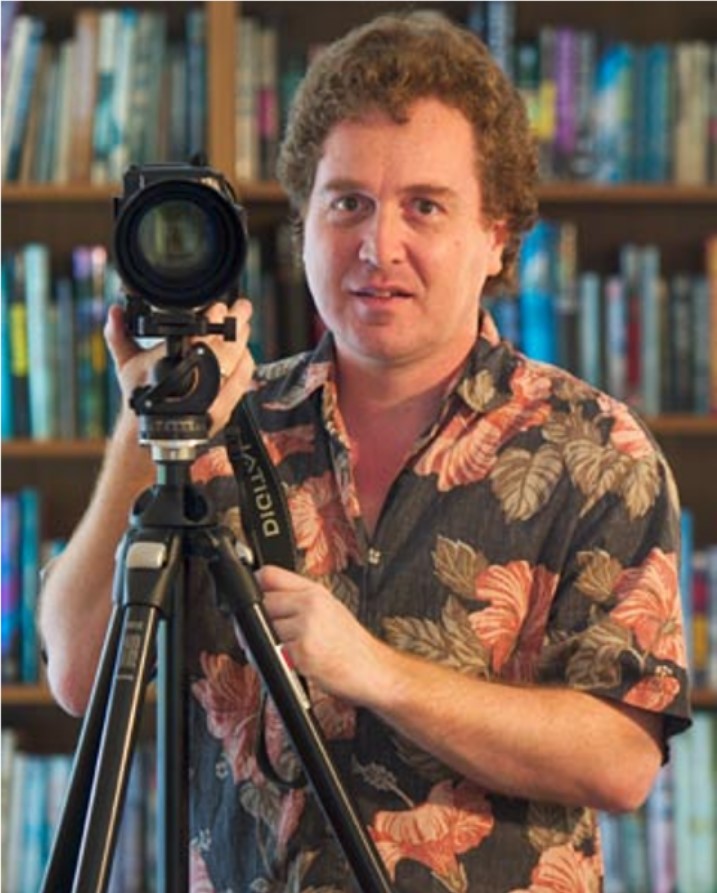 Distinguished Professor of University of California, Irvine
Distinguished Professor of University of California, Irvine
David Eppstein
Title: Computational Complexity and Parameterized Complexity of Folding
David Eppstein is a distinguished professor of computer science at the University of California, Irvine, with research interests including graph algorithms, graph theory, computational geometry, discrete geometry, and data structures.
He is a fellow of the Association for Computing Machinery and of the American Association for the Advancement of Science, and co-editor-in-chief of Computing in Geometry and Topology.
Presentation Description:
Usually, it is preferable in origami to make a design that is easy to fold, and this is reflected in the fact that in practice, computer simulations of folding often work well. However, in theory, these simulations are not generally guaranteed to perform correctly, and for some patterns this may lead to problems such as self-intersections in intermediate states. In an attempt to understand this gap between theory and practice, we review the theory of hard-to-fold patterns, from NP-completeness through fine-grained and parameterized complexity, PSPACE-completeness, and undecidability.
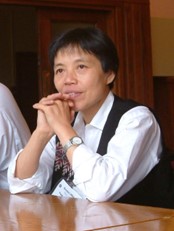 Japanese Origami Artist
Japanese Origami Artist
Tomoko Fuse
Title: Infinite Fold and Repeated Fold
Tomoko Fuse (布施 知子, Fuse Tomoko, born in Niigata, 1951) is a Japanese origami artist and author of numerous books on the subject of modular origami, and is by many considered as a renowned master in such discipline.
Fuse first learned origami while in the hospital as a child. When she was 19 years old, she studied for two and a half years with origami master Toyoaki Kawai. She started publishing origami books in 1981, and has since published more than 100 books (plus overseas editions) as of 2024. She has created numerous origami designs, including boxes, kusudama, paper toys, masks, modular polyhedra, as well as other geometric forms and objects, such as origami tessellations, with publications in Japanese, Korean and English. She now resides with her husband Taro Toriumi, a respected woodblock printmaker and etcher, in rural Nagano prefecture, Japan.
Unit Origami: Multidimensional Transformations, the English language edition of her seminal modular origami inventions, may be considered the classic text on modular origami available in the English language.
Presentation Description:
This presentation will report on a large-scale origami installation that applies "infinite folding" and "repetitive folding" as contemporary art. Origami, which seems cramped within the rules of "folding," actually has wonderful formative potential.
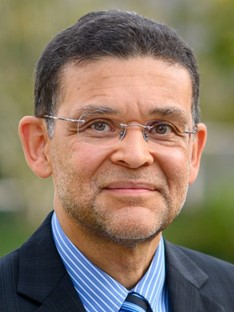 Professor of Princeton University
Professor of Princeton University
Glaucio H. Paulino
Title: Origami Engineering
Professor Paulino is the Margareta E. Augustine Professor of Engineering at Princeton University. His seminal contributions in the area of computational mechanics include the development of methodologies to characterize the deformation and fracture behavior of existing and emerging materials; topology optimization for large-scale multiscale/multiphysics problems; variational methods; deployable and adaptable structures; and origami engineering (topic of the SIAM lecture).
He is a fellow of ASME, EMI, AAM, USACM and IACM, and SES. Recently, he received the Daniel C. Drucker Medal of ASME (2020), the Raymond D. Mindlin Medal of ASCE (2020), the Reddy Medal from Mechanics of Advanced Materials and Structures (MAMS 2020), and the Eringen Medal from SES (2023). He also received the 2015 Cozzarelli Prize from the National Academy of Sciences, “which recognizes recently published PNAS papers of outstanding scientific excellence and originality.” He is a member of the US National Academy of Engineering (NAE), and a former President of SES.
More information about his research and professional activities can be found at the following link: http://paulino.princeton.edu/
Presentation Description:
We study the geometric mechanics of origami assemblages, including tubes and tessellations, and investigate how geometry affects behavior and properties. Understanding origami from a structural standpoint allows for conceptualizing and designing feasible applications across scales and disciplines. We present a reduced-order-model, which consists of an improved bar-and-hinge model, to understand the nonlinear mechanics of non-rigid origami. We couple compatible origami tubes into a variety of cellular assemblages that enhances mechanical characteristics and geometric versatility, leading to the design of structures and configurational metamaterials that can be deployed, stiffened, and tuned.One of these assemblies includes a modular multi-degree-of-freedom soft origami robot with reprogrammable electrothermal actuation based on the Kresling pattern. Another assembly consists of an origami-architected metamaterial at the micron-scale, which was designed, fabricated (using DLW, direct laser writing), and tested (in-situ SEM). This resulted not only in the smallest scale origami assembly, but also in a metamaterial with intriguing mechanical properties, such as anisotropy, reversible auxeticity, and large degree of shape recoverability. In terms of tessellations, we have created triclinic metamaterials by tristable origami with reprogrammable frustration. The nonlinearities of the folding motions allow the unit cell to display three robust stable states, connected through snapping instabilities. When the tristable unit cells are tessellated, phenomena that resemble linear and point defects emerge as a result of geometric frustration. The frustration is reprogrammable into distinct stable and inhomogeneous states by arbitrarily selecting the location of a single or multiple point defects. The presentation concludes with a vision toward the field of origami engineering.
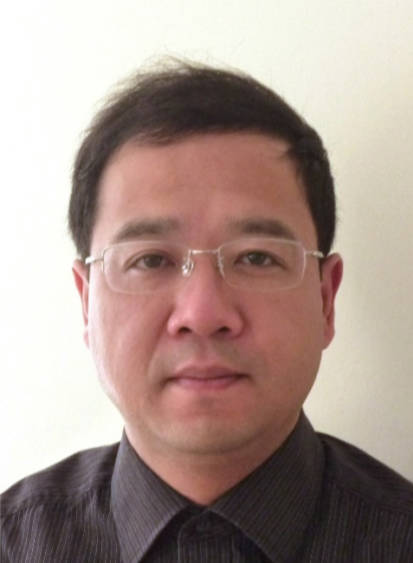 Professor of University of Oxford
Professor of University of Oxford
Zhong You
Title: Beyond the Miura-ori: Innovations and Applications
Zhong You obtained his BS from Shanghai Jiaotong University, and MS from Dalian University of Technology, and Ph.D. from Cambridge University. He is currently a Professor of Engineering Science at the Department of Engineering Science, University of Oxford. He is also a Fellow of Magdalen College. But beyond his academic titles, he's an engineer fascinated by how things fold and transform.
Zhong's research delves into the world of deployable structures – unconventional creations that can drastically change shape. His groundbreaking work has been published in prestigious journals like SCIENCE, PNAS and SCIENCE ADVANCES. Notably, his contributions were selected for the Science Day Exhibition at Buckingham Palace in 2007, organized by the Royal Society. He is one of the few who initiated using origami for engineering applications. SCIENCE introduced his research work in their “profile” section.
Beyond academia, Zhong’s talents extend to practical inventions. He developed a life-saving flow diversion stent for treating cerebral aneurysms. Additionally, his Stardust foldable travel cot has become a bestseller, simplifying journeys for parents with young children.
Presentation Description:
This presentation explores several variations that overcome these limitations. First, we introduce a novel concept based on a unit derived from the double-layered Miura-ori variation. Tessellating these units creates a large, deployable structure with alterable profiles. By considering the torsional stiffness (twisting resistance) of the creases, the structure becomes multistable, achieving both deployability and reconfigurability. As an exciting application, we will discuss a robotic limb with this structure, capable of lifting and holding weights due to its wider range of motion and grasping capabilities. Next, we demonstrate how a single-layer Miura-ori can be transformed into a dual-motion reconfigurable structure using kirigami techniques. Kirigami, the variation of origami with strategic cuts on paper, unlocks additional degrees of freedom beyond that of the Miura-ori alone. Finally, we will compare kirigami with origami for thick panels. Through examples, we will illustrate how kirigami enables more compact folding configurations which are impossible using traditional origami techniques.
Rigorous mathematical modelling and physical validation underpin our exploration of these fascinating structures throughout this presentation.
Dear 8OSME Attendees,
We are delighted to share that all the photos taken during the 8th International Meeting on Origami in Science, Mathematics, and Education (8OSME) are now available for viewing and download:
We hope these photos capture the spirit of collaboration, creativity, and innovation that defined this year's conference. Whether you presented your research, participated in workshops, or simply enjoyed the event, we invite you to relive those moments and share them with your colleagues and friends.
Thank you once again for making 8OSME a memorable event. We look forward to seeing you at the next conference!
Best regards,
8OSME Organising Committee
A big thank you for registering and coming to our conference.
If you have not registered yet, please kindly do so via our registration portal (8OSME Website --> Registration).
Please let us know if you experience any issues with registration.
The final version of the Program of 8OSME is now released, please find the attached program for the 3 days via the link below:
![]() Program of 8OSME_Final Version_v2.pdf
Program of 8OSME_Final Version_v2.pdf
![]() Program of 8OSME_Final Version with Abstracts_v2.pdf
Program of 8OSME_Final Version with Abstracts_v2.pdf
We look forward to seeing you in Melbourne soon!!!
Best Wishes,
8OSME Organising Committee
Thank you for submitting your papers to 8OSME. We have extended the submission deadline for the final papers to 10th May 2024. In the coming days, you will hear from us reviewer comments on your paper, if you have not received them yet. The proceedings of 8OSME will be published by Springer. The Editors will compile all the papers and submit them to the publisher by 15th May 2024.
For your revised paper, could you please
1. Ensure that all third-party rights have been obtained 2. Upload your revised paper in pdf to EasyChair 3. The publisher also needs a copy of original source files (Word, TeX, figures, etc). Could you please email them to 8osme@swin.edu.au? Please put the paper No. as subject heading and also as the file name of your paper.
Please note that presentations can be made even without full paper submitted/accepted. Please also note that early bird registrations close on 15th May 2024.
Best wishes,
Guoxing Lu
Chair, 8OSME
We are pleased to report that, at the request of a number of authors, the deadline for full manuscript submission has now been extended to 14th March 2024. Please submit on https://easychair.org/conferences/?conf=8osme.
The 8th International Meeting on Origami in Science, Mathematics and Education (8OSME) will take place in Swinburne University of Technology, Melbourne, Australia between 16th and 18th July 2024.